Exclusive Interview
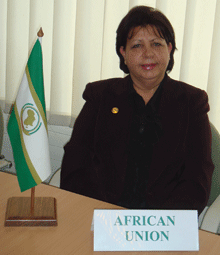
African Union, Geneva, Human Rights Council, Africa, multilateralism, culture, solidarity
With the on-going crisis in Darfur, the African Union (AU) has really come to the forefront of world affairs. Not a day passes without us hearing about the Darfur peace talks undertaken by the African Union and the United Nations in the press, on TV … However, the African Union is far more than just a peace negotiator, so in order to know a little more we went to see Ms Masri, the ambassador and permanent representative of the African Union here in Geneva.
Ms Masri, a dynamic woman of Tunisian origin, whom her colleagues in Geneva have given the nickname ’Mama Africa’, is a defender of African interests, and she does it well-to an extent that she has been made an Honourable Member of the Diplomatic Circle of Geneva.
Leaving the floor to Ms Masri … and to ’Africa’.
Q: Ms Ambassador, who are you and what is your background?
My name is Khadija Masri, and I’m a national of Tunisia. I’m a career diplomat with more than twenty-six years of experience with the Tunisian diplomatic corps. I felt that I was at the end of my career, and therefore I wanted to gain another experience, a more continental one with the African Union. That’s the reason why I applied, with other candidates, for this position as Permanent Representative of the African Union here in Geneva—and I succeeded.
Q: Do you like Geneva?
Yes, I do. Geneva is an important international platform, with its multitude of international organizations. It’s an enriching experience for a diplomat because it gives you a more global vision than any other diplomatic posting. Of course, in the multilateral arena we are dealing with a variety of fields—human rights, health, intellectual property, trade issues at the WTO, labour laws at the ILO—not to mention all the other organizations. If the figures are right, there are about twenty international and inter-governmental organizations based here in Geneva. The spectrum is huge, so you learn a lot; and not least, you work a lot, but as we say in French "le travail c’est la sant?" !
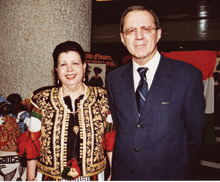
Q: Apart from the Darfur crisis, we do not hear much about the African Union. Would you be so kind to tell us more about it?
That you do not know about the African Union surprises me a little! The denomination might have changed to the African Union, but before it was the Organization of African Unity (OAU), an organization existing since 1963. The character of the organization, I would say, was political, as the majority of the African countries in those days were under colonial rule. One could say that its mission was to fight for the independence of the continent and the African countries in particular, which started to gain their independence one by one in the 1950s onwards.
The evolution of the organization from the OAU to the African Union was accompanied by changes in the international environment, one of which was development. OAU won the first battle for our continent and our countries. The second battle which the AU is now engaging is the fight for sustainable development on the continent, as well as the economic integration of the continent into the international context.
This transformation process has been taking place progressively since 1979 and led to the restructuring of the OUA as a "new" organization. Of course, it gave itself several visions, and, if I may resume it in one phrase, I would say it is to build an integrated and prosperous Africa in peace, counting on its inhabitants, and constituting a dynamic force in the international arena.
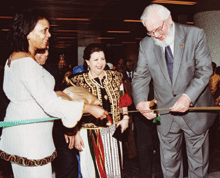
The organization plays the role of an interface between Africa and the rest of the world, in order to show that Africa is not a continent collapsing under the pressure of famine and conflicts—all that is negative—but rather a continent that can continue to conduct an open dialogue in an equal partnership with all regions of the world. This is the main vision of the African Union.
Other visions concern economic integration, good governance, promotion and respect of human rights, promotion of peace, security ... not to mention integration of the different economic regions in Africa. Altogether, there are eight of these zones scattered around the continent. We are trying to harmonize them—some of them are very well developed on the legal aspects or on the free movement of persons, others a little less. For instance, in some of these regions people can travel without visas or passports. This might seem a little strange for people who do not know Africa, but I would like to say that Africa is the victim of a lack of information, and you as a journalist and a representative of the media have a certain responsibility. I do not blame anybody, but, with all due respect, the fact is that Africa is always shown in a negative way in the media. Of course, negative things exist, but the positive things going on are never or seldom highlighted, and that is quite important. Africa has always been a resource for everybody—natural resources such as oil or gold—you can find everything. Up to the present time, however, it is not Africans who have been exploiting these resources. They are sold at very low prices to foreign companies. Unfortunately, this does not benefit us. There are no advantages for the African people. This is one of the battles for the African Union—to recreate the positive effect, to improve the lives of our people. We have to harmonize the "house" inside. We have to achieve an internal African common market for our products. This is one of the core issues in our policy for eradicating poverty. It would create work for the population, improve living conditions, health services, and—not least—improve infrastructures. A good infrastructure is also a key element for the improvement of commerce and trade and a necessity for making our products competitive and accessible on the global market.
I would like to say two things: Africa is really a victim and it’s suffering from a lack of information. I know that one day we will be able to count on ourselves, and the Commission of the African Union is working on several projects. One of them is a TV channel like Euronews. But in the meantime; I would like to make an appeal to the media to make Africa better known, so that the image of Africa would be better perceived and reflect a better image of the continent in the international media.
Q: Do you think that showing Africa suffering comforts other people-it makes them feel that things are better at home?
This is the wrong way to approach the subject, especially in the long term. It is not by showing that others live in extreme poverty that things are going to get better at home. Of course, there are different levels in the world, but there are nevertheless other regions of the world where the situation is quite bad—Latin America, Asia—but you do not see nor hear about them in the media, and if you do, it’s only occasionally.
I do not condemn anybody, but I realize that this is the way news about the continent is being shown in the media. However, the fact is that there is a lot of wealth and diversity in Africa—historical, cultural.
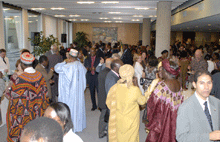
Why historical? Simply because it’s the oldest known continent in the world. Diversity?-if you look at the map, it’s really a continent. Inside its area you find a wide variety and tremendous wealth—natural resources, languages, dialects, cultures. You simply cannot show such a rich, varied and diversified continent in such a negative way!
So I say to the Africans: "we must count on ourselves". Perhaps, we could be assisted by our partners in order to change this perception. But it’s a question of mentality—this idea that Africa is the root of all problems. That is far from being the truth! So I say it’s up to us—the Africans—to put forward the true value of our continent and the real image of Africa.
Q: What is the true image of Africa?
It’s a positive image, which reflects a very promising future—an educated and competent youth. These important human resources will shape the new Africa. At the moment, when we have the foundations of development, there is no reason why we should be confined to underdevelopment. There are some regions which are more developed than others. However, if we can organize ourselves better and put together development projects, I think Africa in a short time will surprise the world! I am very optimistic!
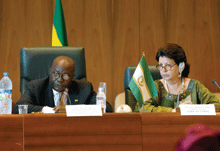 Q: You are known as ’Mama Africa’. Why this commitment for Africa?
Q: You are known as ’Mama Africa’. Why this commitment for Africa?
I’m African after all. I might have been born at the change-over time between the colonial period and the independence. I was born in 1953, so I cannot say that I remember the colonial time, but my parents, my neighbourhood, did. I had the chance to attend school during the independence period. One should not be ungrateful toward one’s country nor one’s continent, because this schooling became available in this new era of independence and development. Women became equal partners everywhere, and found their place in society. Of course, all this is thanks to our forefathers and the generations before us who, I would say, built the essential foundations of this new Africa. In certain regions of Africa these foundations are really solid. For instance, if this were not the case, I would definitely not be here. I might have found myself living in a remote village surrounded by numerous children and living a life based upon the former social and economic conditions of my country.
For instance, in some African countries—and even in some European countries—men and women do not receive equal pay, whereas in my country this exists. One could say that certain mentalities should be developed further, but legally this equality between the sexes exists. So Arab-African women have something to be proud of. The Arab-African women have all the rights. In certain parts of Africa, we are now promoting partnership in a married couple. This is very positive and there is less fighting and disputes. When you are a partner, things are clearer and more positive.
Therefore, I am honoured to bear the title of ’Mama Africa’ because it shows the confidence of my peers, of the African group. They must feel that there is commitment and devotion to the cause.
Q: It’s true that you have to have confidence in what you do?
It’s not only that. If you are not committed, and if you do not know where you come from and where you are going—you stand still. Every day you are confronted with challenges. We live in a global village, and this implies that you know what is happening everywhere almost at the very same minute it happens, and you are confronted with challenges to overcome. So I say that each African, wherever he is—in the field, in the mine—his political convictions should overcome the daily challenges for a better well-being and better living conditions. Finally, if we talk in simplified terms—what does each one of us aspire to? —you, me, him, Mr. X or Ms Y. It’s for us now and for future generations to live in peace, security and well-being.
That’s the reason why I said earlier that it’s wrong to give a bad image to certain poor regions in the world. What is happening to your neighbour will affect you sooner or later. For instance, if your neighbour’s house is burning, your house may catch fire too!
So it’s better to prevent it, and to have solidarity with people. This is why I insist on partnership, responsible partnership. By that I mean, not the kind of partnership where each one is defending his own interests, but a win-win partnership. Perhaps you may have to make some concessions on certain things—such as in trade negotiations—but in the long term you will win because I will open up my market to you. However, on the other hand, you should allow me to live, to feed my family, to pay my employees, etc. Therefore, I say that with this globalization, it’s important that the world becomes closer and that we know each other better. We might be different, we may not look alike and come from different regions, etc., but finally we are human beings are all the same.
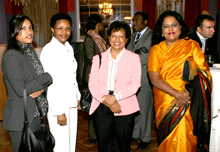 Our objective is to live together in peace, security, harmony and respect. If we know each other better, we can put the positive and negative in the balance. We have to share the good things in the world—as well as the worst. There might be a disaster somewhere in the world, but others should show solidarity. Of course, for the development of all the others, we have to share, make concessions. We do not ask for the impossible, but a minimum of comprehension and sharing.
Our objective is to live together in peace, security, harmony and respect. If we know each other better, we can put the positive and negative in the balance. We have to share the good things in the world—as well as the worst. There might be a disaster somewhere in the world, but others should show solidarity. Of course, for the development of all the others, we have to share, make concessions. We do not ask for the impossible, but a minimum of comprehension and sharing.
Famine and diseases on my continent have no borders. An epidemic will cause migration and people will flow across borders. You are not protected. So what is better? Help us to keep our population at home, in their fields—they need to make a living.
I think this is a new culture, and I say that the international community here in Geneva can do something. Everybody should join—including the media—in order to get to know each other better, and be able to put ourselves in other people’s shoes, because this would solve quite a lot of problems.
Experience has shown that to condemn certain countries, such as happened with the former Human Rights Commission, did not lead to any result. I am optimistic that the newly established Human Rights Council will create a spirit of dialogue and comprehension. Of course, there are problems in this or that country. Let us go there together to analyse it and define together the remedy. Even the county in question would have more confidence if we came there to help them — that’s the difference. Therefore, we should change our mentality and not be egoists. It’s not a case of "it’s not my problem" but only the concern of others. With this global dimension of the world and with the new means of communication, we know minute by minute what is happening elsewhere and therefore we cannot be indifferent!
Q: In order to dialogue with "the egoists", might it not be easier to change their mentality.
If we approach each other, and we dialogue in a more concrete, more pragmatic and also in a more transparent way, I think that we will be able to find solutions. It’s not an easy task, but perseverance, dialogue and human relations play an important role. Who would have said in the years following the Second World War that fifty-three countries would gain their independence? For our parents and their generation, this was a dream. So let us continue dreaming—a concrete dream.
We, the Africans should become better organized, have better statistics for instance. "They" are better "armed’ than us; "they" have better technologies; "they" have more expertise perhaps.
Q: I have the impression that the African Union is imposing itself on the international scene.
We are not imposing ourselves, but we are trying to occupy the place that is reserved for us. We have, after all, a place in this world. We are, after all, a continent with fifty-three different countries. In the United Nations this is a very respectable group. The fact is that the Africa Union is organizing itself in order to better defend its interests, and to take its place at the table. We are not trying to become a force to block the others—this is not at all the case. We just want to occupy the place that is ours.
We do not wish to revive the sad events of history, but the fact is that Africa has been exploited. So now the time has come to rehabilitate it. Africa takes its place and starts to exploit its own resources.
Q: The African countries are quite diverse, both linguistically and with different cultural heritages from their colonial masters. How do you reach harmony in meetings?
The African continent is very diverse and perhaps it’s this diversity that constitutes our wealth. The African Union has four official languages and in our meetings we normally have interpretation.
Despite our differences—cultural or linguistic—it works very well. Perhaps this is also due to our culture of solidarity, the culture of helping one’s brother. This has always been a positive point. Of course, we might have differences of opinion in discussions, but this is a democracy so in the end we always reach a common agreement.
Q: What about the ambiance?
We have a very good spirit. The group consists of high-level expertise, and this is one of the reasons why I’m very optimistic. When you have people with of a high-level of intellectual capacity, the problems dissipate quickly and easily. That’s why I say we need better comprehension and a level of instruction in our countries. It’s important to reinforce our capacities in education and health—these are basic fundamental rights.
When you deal with people at a certain level, you cannot come to the table with Kalashnikovs! I do not say this just to praise my continent, but I’m thrilled about the African group in Geneva. I always learn something from them. Because in this diversity you always have something to learn and something to give—and that’s what is positive about it. There are others groups in New York, etc., and I have heard from my colleagues that the ambiance is good there too. However, in Geneva—it’s multi-sectoral and we deal with all kinds of subjects. The ambiance is lively!
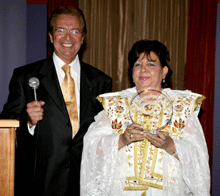 Q: You have become an Honorary Member of the Geneva Diplomatic Club.
Q: You have become an Honorary Member of the Geneva Diplomatic Club.
This is another opportunity to promote Africa because of my position here. I am just one small citizen from this continent. The most important aspect about this is that Africa opens up to other circles and that is my mission in order to give more visibility to the organization and the continent, to open up to other communities. The mission of the Diplomatic Circle of Geneva is to bring people together—the business community, internationals, diplomats. Why not try to find partnerships in this environment too. Of course, I’m thrilled about this distinction, and I will continue to fight for more visibility for Africa so as to give this continent the image that it deserves.
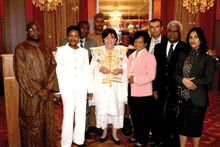
Q: For businessmen and other people who would like to establish partnerships with Africa—what should they do? Should they get in touch with you?
Of course! Our office will provide them with information, and then there is our Headquarters in Addis Ababa. Several departments there are concerned with political or economic affairs. We are the liaison between the AU and the international community in Geneva and vice-versa.


